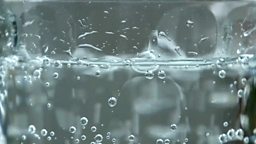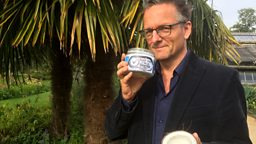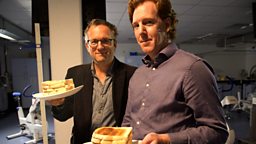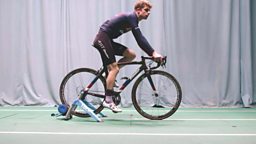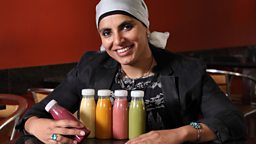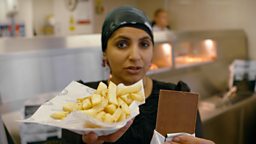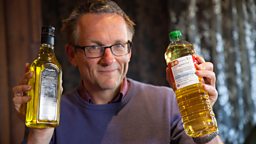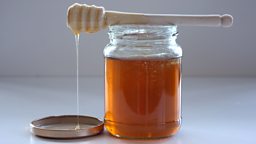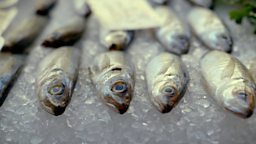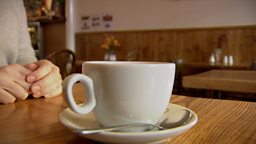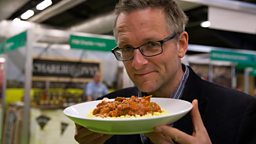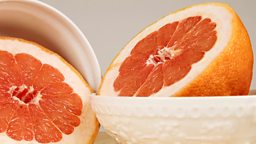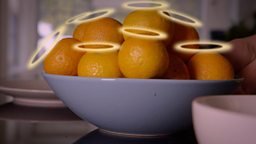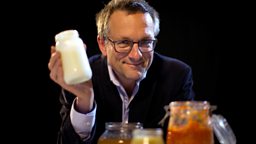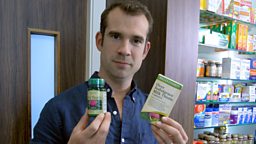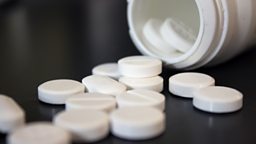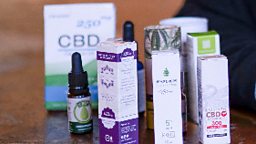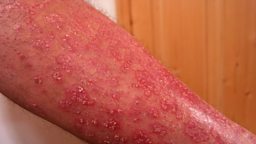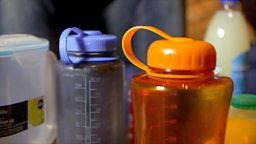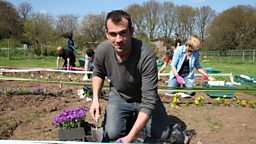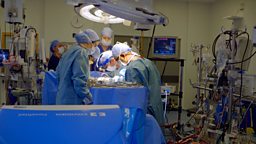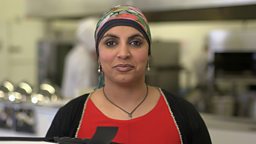The big blood pressure experiment
Dr Chris van Tulleken sets out to test the health claim made for three foods – beetroot, garlic and watermelon. It’s said they can all reduce our blood pressure but what’s the truth? High blood pressure is a major risk factor for heart disease, the U.K.’s biggest killer, so if such claims are true then these three foods could be lifesavers.
Dr Andy Webb of Kings College London helped run an experiment to find out what effect these foods really have.
The experiment
The experiment involved 28 volunteers who all had a systolic blood pressure above 130mm of mercury (the ideal blood pressure for an adult is around 120), and they were divided into three groups. During the first week:-
- Group 1 ate two cloves of garlic every day.
- Group 2 ate two large slices of watermelon a day.
- Group 3 ate two whole beetroots every day.
For the second and third week, each group swapped over so that by the end of three weeks everyone had tried each food.
What’s so ‘super’ about garlic, beetroot and watermelon?
We hate the term ‘superfoods’ so often bandied about in the media, but it’s true that some foods can have a beneficial effect on our bodies. So we set out to test three that are supposed to help reduce blood pressure.
In theory, all three foods essentially lower blood pressure the same way - by making our blood vessels dilate they allow blood to flow more freely. But they each do this in a different way.
The differences between garlic, beetroot and watermelon
In garlic one of the main active ingredients is thought to be a chemical called allicin which is released when you chop or crush garlic. It’s believed to act on our kidneys, changing levels of hormones and causing the blood vessels to open up.
For beetroot, the active ingredient is nitrate - present in both the leaves AND the root.
When we eat beetroot, bacteria that live in the mouth turn the nitrate in the beetroot into nitrite and this in turn is thought to get changed into nitric oxide which causes the blood vessels to dilate – lowering our blood pressure.
In watermelon, the active ingredient is called L-citrulline and this also works by increasing the levels of nitric oxide which again dilates our blood vessels and so lowers blood pressure.
The results
Each volunteer measured their blood pressure twice a day - morning and evening. Each time they took 3 measurements to calculate an average. It was then possible to see which foods made the biggest difference to blood pressure.
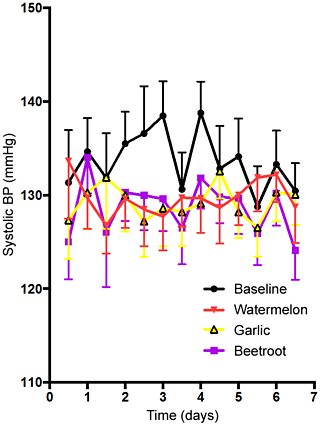
The baseline blood pressure for the group—the average reading taken when everybody was eating and drinking normally - was 133.6 mmHg. On the beetroot diet, this went down to 128.7 mmHg and the garlic gave a similar result (129.3 mmHg). The result in this small study is in agreement with what Dr Webb and others have found in larger studies.
Studies on the links between high blood pressure and heart disease suggest that, if such a drop in blood pressure is maintained, this roughly translates into a reduction of the risk of stroke and heart attack by 10%! Watermelon didn’t have such a strong effect - it reduced systolic blood pressure to 129.8mmHg. This may be because water melon is mainly water- there isn’t much of the active ingredient.
What does the experiment tell us?
Our small study adds to a growing number which suggest that eating beetroot and garlic regularly may help reduce your blood pressure. But these aren’t the only foods that can do this. The active ingredient in beetroot, nitrate, is present in plenty of green vegetables: celery; lettuce; watercress; rocket; spinach; chard; broccoli; for example.
And the active ingredient in garlic – allicin – is also present in onions, shallots, leeks, chives and spring onions.
It turns out there are several foods which can help keep our blood pressure low. But, crucially, how good they are depends on how they’re prepared.

To get the most nitrate from your vegetables
- Eat salad and vegetables raw. Nitrate is intact in the vegetable in their uncooked states but can be reduced by processing and cooking. It is also water soluble and so if your boiling, steaming beetroot or spinach some of the nitrate will be lost in the water. Pickling also reduces the amount of nitrate in beetroot as it’s lost in the picking vinegar.
- If you do boil beetroot, leave it as it is: don’t peel or top and tail it before boiling.
- Have beetoot juice (why not try juice with other flavours such as apple, celery and a little ginger). In juice, you retain most of the beetroot in its raw state.
- Make soup – the nitrate lost in the water will remain in the soup.
- Steam spinach and other vegetables rather than boiling (you use less water so you’ll lose less nitrate in the water).
- Use the water from cooking in soups and stews.
The best way to enjoy the blood pressure lowering effects of the allicin in garlic
- Crush or chop as finely as possible: The finer you chop or crush, the more allicin is released.
- Use the garlic as soon as possible after chopping or crushing (e.g. add to soups and stews at end just before serving, or put your garlic on toast, bruschetta, mushrooms…). Allicin degrades quickly so as soon as you’ve peeled or chopped your fresh garlic the allicin has already started to break down.
- Don’t microwave your garlic. Cooking speeds up degradation of allicin and microwaving appears to destroy it completely.
Warnings!
- Don’t over do it. Too much garlic may cause irritation and digestive upset.
- Some people are allergic to garlic, if you suspect this is the case seek medical help.
- Garlic in its raw state can burn, so don’t hold it in the mouth for long periods.
Other changes you can make to your lifestyle to help reduce high blood pressure
Some of these will lower your blood pressure in a matter of weeks; others may take longer.
- Be active: being physically active is one of the most important things you can do to prevent or control high blood pressure.
- Eat a healthy, low saturated fat, balanced diet, including plenty of fresh fruit and vegetables.
- Cut down on alcohol.
- Stop smoking.
- Maintain a healthy weight.
- Cut your salt intake to less than 6g (0.2oz) a day.
- Drink less coffee, tea or other caffeine-rich drinks such as cola. Drinking more than four cups of coffee a day may increase your blood pressure.
NHS links
-
![]()
Experiment protocol for the big blood pressure experiment
Experiment protocol for the big blood pressure experiment




















